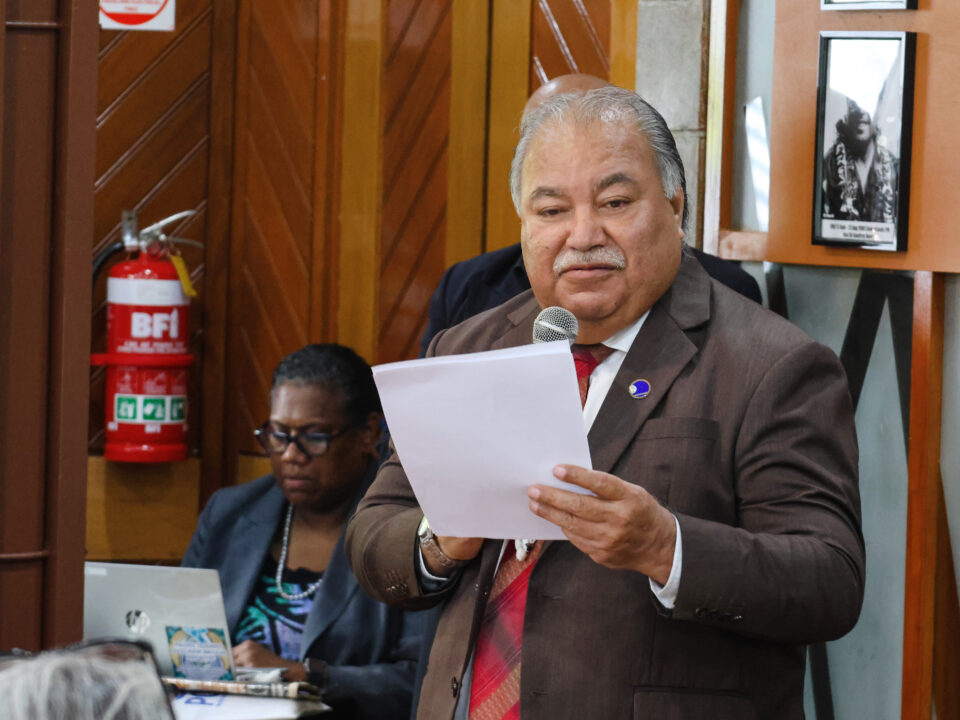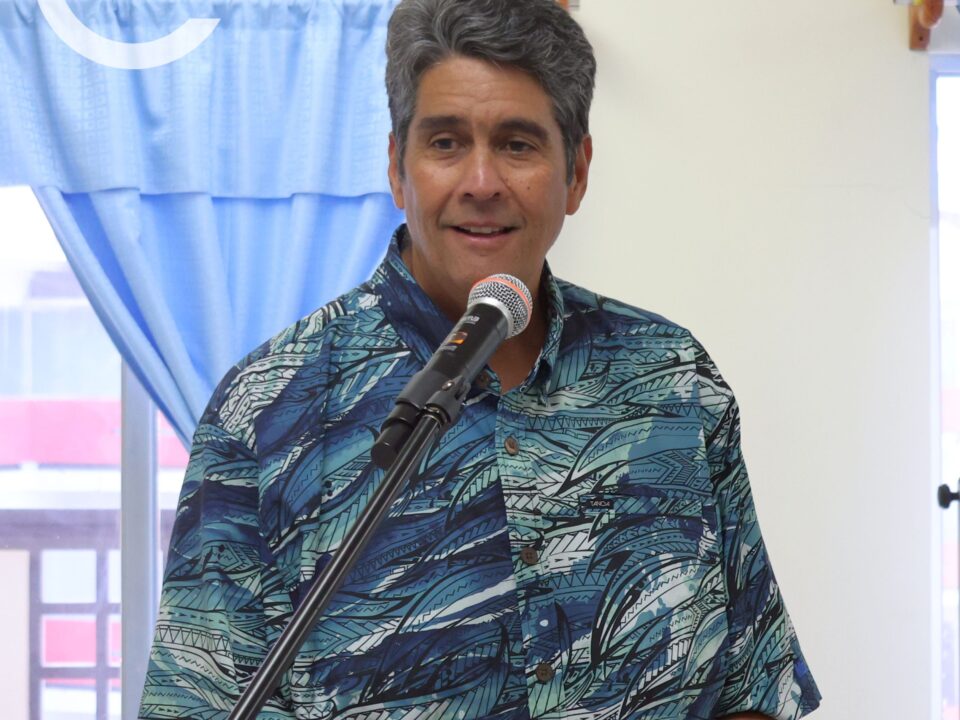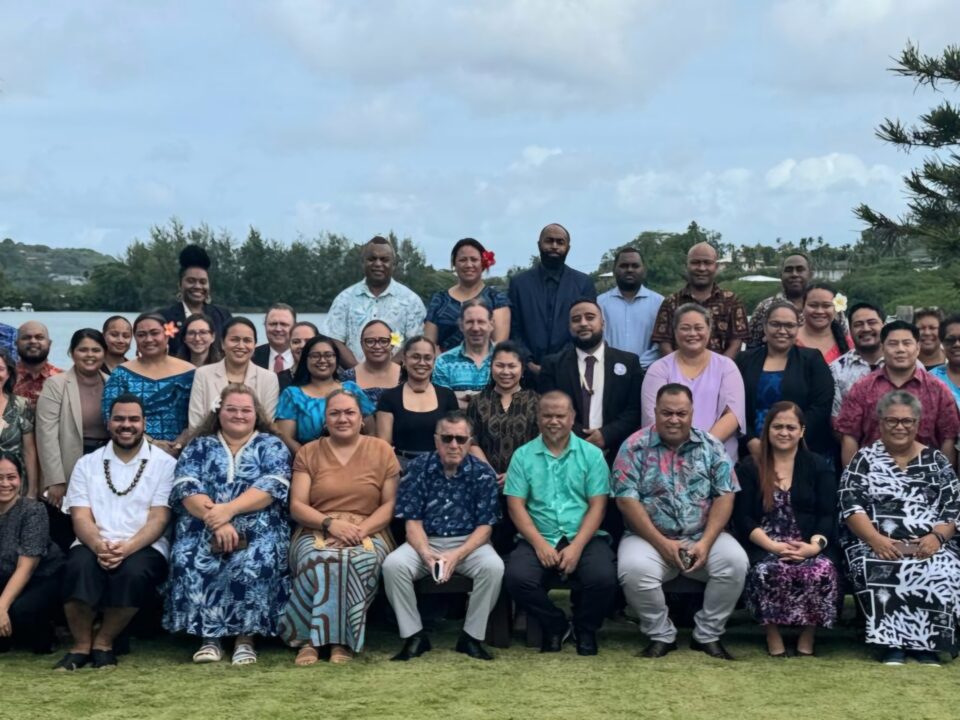
Prime Minister of Tuvalu and Chair of PSIDS Hon Feleti P Teo delivering keynote address at Pacific Ocean Ministers Meeting in Suva, Fiji. PHOTO BY: Pacific Community (SPC)
OCEAN MINISTERS PREPARATORY MEETING TOWARDS UNITED NATIONS OCEAN CONFERENCE
PACIFIC ISLANDS FORUM SECRETARIAT, SUVA, FIJI
10 APRIL 2025
Excellencies.
Honourable Ministers.
Representative of the PIF Chair.
Forum Secretary General HE Baron Waga
Ladies and gentlemen.
A very good morning to you all. Thanks for the opportunity to provide some remarks in this opening session in my capacity as the current chair of the Pacific SIDS. A role that was only bestowed on Tuvalu last month.
It gives me enormous pleasure to join the representative of the PIF Chair to welcome ministers and delegates to this Ocean Ministers Preparatory Meeting Towards the 3rd UN Ocean Conference in Nice, France in June.
As custodians of the largest ocean in the world, the Pacific Ocean, we are truly blessed with its abundance of resources. As I told the women conference yesterday, the Pacific Ocean is not just a resource; it is our home, it is our livelihood, and it is our connection to our ancestors.
However, the ocean also represents our greatest vulnerability, particularly low-lying atoll nations like Tuvalu, as climate change induced sea level rise continues to threaten our future survivability as a nation and as a people if sea level rise is not halted and reversed.
The ocean is constantly under threat. From domestic sources such as marine and land-based pollution and overfishing. And from external sources such as ocean warming and climate change caused by excessive greenhouse gas emissions and invasive species.
For the Pacific, the upcoming third UN Ocean Conference presents a crucial opportunity where we will hold ourselves accountable and at the same time also hold other countries accountable for the threats on the ocean and the current health of the ocean.
I thank the PIFS and the OPOC for convening this ministerial meeting, so that we as a region can strategize on how we can demonstrate to the rest of the world that we have been smart and responsible stewards of the ocean.
And at the same time hold the global community accountable to the standards of stewardship that would ensure the long-term sustainability of the ocean so that future generations can continue to enjoy. As we strategize over the next two days, we should also be mindful of the key leadership roles of some of our members who are leading some powerful and influential international groupings like Palau who chairs the AOSIS and Samoa who is the current chair of the CHOGM. (Commonwealth Heads of Government Meeting)
Through their leadership, we can seek to garner support from those larger groupings of our Pacific regional positions.
I understand that OPOC has and will continue to coordinate ongoing technical preparations with CROP agencies and the Pacific Ocean Alliance, and I look forward to the update on those technical preparations.
Our role as Ocean ministers is to provide the political vision and leadership consistent with the vision of the 2050 Blue Pacific Strategy. I hope by the end of our deliberations tomorrow; we will have a strategy
(or a game plan) that will guide our engagement as a region at UNOC3 that gives us the best chance to advocate successfully our regional priorities on the global level.
Ministers, if I may beg your further indulgence, I as PSIDS Chair wish to highlight a few points which most of us will be contemplating and considering in the next few months leading up to and beyond UNOC3.
The first is the call for early ratification of the BBNJ Agreement. I congratulate Palau, FSM and RMI for leading the way for us in the Pacific by having already ratified the BBNJ instrument. In 2024 alone, OPOC has conducted national consultations in Fiji, Solomon Is and PNG. So far in 2025, national workshops were conducted for Tuvalu, the RMI and Samoa and I hear workshops in Kiribati, Cook Is, and Vanuatu will be
coming up.
The message on the BBNJ is simple and clear, we cannot effectively manage our EEZs without having a compatible management regime within the high seas area. I hope this may be a matter we can all discuss over the next two days and agree on a regional collective approach.
The second is marine pollution which warrant collaborative international efforts. The marine pollution, particularly from plastics, poses a significant threat to the health of the ocean and a binding international agreement is warranted and essential to tackle this urgent issue.
The third is the critical need for more financial resources to support ocean actions. Ministers that were at the Honiara Summit on UNSDG14 Life Below Water in February this year would recall that SDG14 had been identified as the least funded goal for years. The challenge lies in securing adequate, long-term funding to support initiatives, particularly in coastal restoration, marine conservation, and sustainable development projects. So, innovations in financing mechanisms are required for achieving a healthy and sustainably managed ocean.
The final point is the need to address the lack of integrated policies that address simultaneously the interconnected ocean domains. The health of the ocean, climate stability, and biodiversity are deeply
interconnected and intertwined. They must be addressed and managed in an integrated manner and not in isolation to promote effective and efficient ocean management and climate
action efforts.
I am glad to observe that the ocean ministers present at this meeting are drawn from numerous related portfolios including foreign affairs, climate change, resource and development, meteorology, fisheries and
environment which is the kind of mix that should promote an integrated approach to ocean management.
Ministers, I thank you for bearing with me as I felt the need to bring out those points and I look forward to our deliberations over the next two days. With those remarks I wish ministers you a successful and highly
productive meeting.
Vinaka and fefatei lasi.



